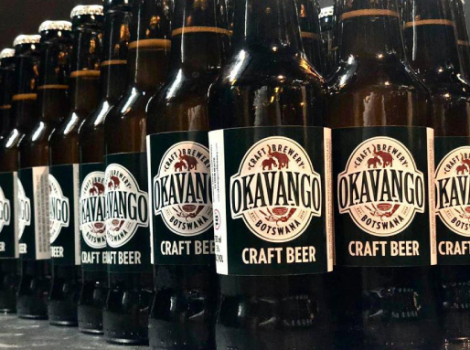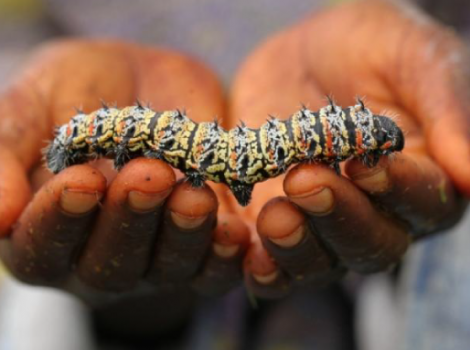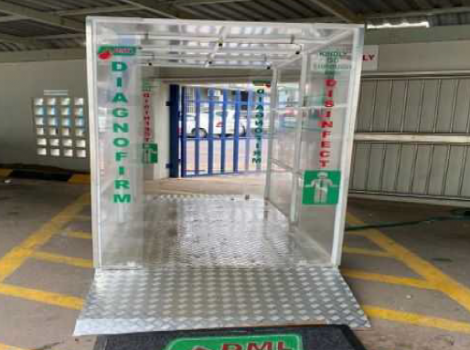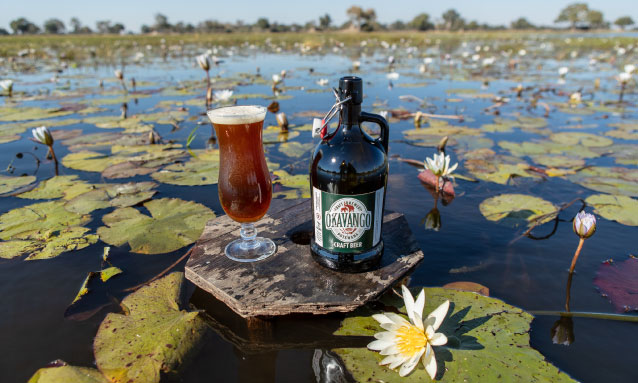
Every so often, we spot a local business venture that truly deserves to be celebrated. One such company is Okavango Craft Brewery, northern Botswana’s first licensed microbrewery that offers a variety of unique millet adjunct beers made on location in Maun. But the company is more than just a brewery, as it also serves gorgeous wholesome food at its newly renovated brewpub and beer garden. Furthermore, it offers a tour of its facilities for a complete customer experience of their offer.
Only established in 2019, you’d be forgiven for thinking Okavango Craft Brewery has been around for way longer. The company first came on our radar around the same time it burst onto the scene and since then, we have been very keen to get an interview with the people behind it. Luckily for us, Okavango Craft Brewery Director, Graham McCulloch, was happy to tell us more about this exciting new venture.
Would it be a fair assessment to say you’re the first craft beer to come out of Botswana?
It is the Okavango’s and northern Botswana’s first craft beer, but we can’t take the title of first in Botswana. Big Sip was established in the capital, Gaborone a few years previously. We are the first craft beer to use local products, however, and this underpins the vision and ethos of our brewery and the craft beer we produce.
That’s fantastic to hear but more about that later. How did the name come about?
The name captures the essence of the beer. All of our beer is made with crystal waters from the Okavango Delta, using millet malt that is grown by local farmers living in and around the Okavango. We are truly a beer made in and using ingredients from the Okavango.
We love that! All too often, we feel there’s a snobbery towards local products, so we applaud you for that. Who is behind OCB?
We are a team of individuals who share the same vision: to create an innovative product to support the lives and livelihoods of local farmers who live with wildlife, contributing to a diversified wildlife economy, and making and drinking great quality beer in doing so.
Each of the five shareholders has their own unique experience and skill-set that they bring to the table: Graham McCulloch and Anna Songhurst are conservationists who have been living in Botswana for a combined 40 years, working on wildlife management and conservation projects, mainly Human-Wildlife Conflict.
They teamed up with colleagues and friends Loki Osborn, an experienced entrepreneur who has also researched and run projects to reduce Human-Wildlife Conflict in southern Africa. Then there is Heine Du Toit, a food tech scientist and food and beverage product developer extraordinaire, and Francine Sheldon, who has decades of experience in sustainable development project management and finance.
My wife and I have a background in conservation – my wife did her PhD on the Human-Elephant Conflict in the Okavango Panhandle. I’m an ecologist by profession. After starting my career as a safari guide and later conducting my PhD on the wetland ecology of the Makgadikgadi Saltpans, I’ve been involved in conservation work ever since. Not much of this has prepared us to be Directors of a microbrewery. Don’t get me wrong, it’s a dream most people would share and the prospect of making one’s own beer was not a hard decision for me. But, setting up a business of any kind is a challenge, and doing so in the face of COVID is, one might say, madness.
What’s the secret? Well, it’s still early days, but it’s about applying one’s skills and experience and, of course, teamwork. We are a great team with a broad set of skills and lots of collective experience in all the various facets of running a brewery business.
Wow, a truly diverse but undoubtedly skilled team, then! We couldn’t help but notice that there are elephants in your hard to miss branding. What’s the relevance of this in relation to OCB?
In an effort to drive new and innovative ways to diversify the wildlife economy in northern Botswana, Okavango Craft Brewery now produced beer that contains millet grown by small-scale farmers who coexist with elephants, improving benefits for sustainable farming practices tied to a wildlife economy.
Farmers who receive a premium price for their surplus millet meet a set of ‘elephant aware’ farming criteria: avoid farming on elephant corridors; actively protect fields from elephants using passive deterrent methods like chili fences, flashing solar lights and solar electric fencing, and adopt conservation agriculture principles and practices to protect and improve soils, crop yield and food security.
We wanted our brand to incorporate as much of the story behind the beer as possible, hence the elephants, a sheaf of millet held in a female farmer’s hand and the traditional bowl, used to symbolise food security, which is also an item used in the making of traditional millet beer in the region.
Clearly, a lot of thought went into it. How long have you been operating?
We started working on the project some four years ago, but the company was officially established in 2019. We finally got all our licenses and other paperwork, including our manufacturing license in early 2020 – not an ideal time to be given the go-ahead to launch a brewery!
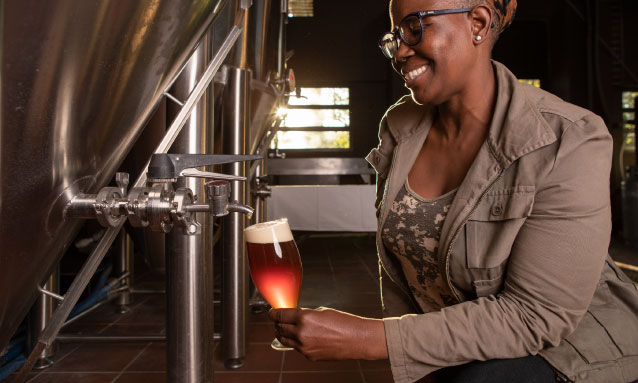
And you wouldn’t even know, given what a well-oiled machine the brewery is! But good on you for soldiering on. In a market that is arguably crowded with various adult beverages, how would you say the competition against OCB is stacking up?
We fall into the craft beer market, which we share with many craft beer micro-breweries in southern Africa. There is stiff competition in the marketplace, but you have to remember that craft beer is all about being a local product, and we are very much a local product for the local market.
While we cannot compete with the price of large-scale industrial brewery beers that are made cheaper at scale, our product appeals to a wide range of local consumers. The local consumers have shown interest in the beer and signed up for our customer membership programme, with the majority being citizens. In addition to this, the tourism industry is very keen on more local products. That being the case, we hope the story behind our beer will enhance the customer experience and in turn, give it a competitive advantage among visitors to the Okavango region.
With such a solid story behind your brand, it should really resonate with most if not all your customer. We’ve yet to try your craft beer, so what would you say sets your brand of craft beer apart from the rest?
We are a Maun-born company with a unique story behind us, which will give us provenance and a sense of pride among our local consumers. Our unique story has an important social and conservation impact with key supporting messages. This will appeal to people, in particular, the growing number of responsible tourists, who want to support such initiatives when visiting the Okavango Delta.
It’s no secret that the first question most people ask when at the bar is, what have you got that is local? So, most people will generally go for a quality product that is made locally, and we hope that that will stand us in good stead in the marketplace.
But make no mistake, the primary objective is to make a selection of top-quality beers that people will love.
Head brewer, Murray Stephenson, has many years of experience making quality craft beers in South Africa and under the professional guidance and experience of food tech expert and business partner, Heine Du Toit, Destin Bidzouta-Zola and his Batswana trainee brewers, we have developed a great selection of millet adjunct beers.
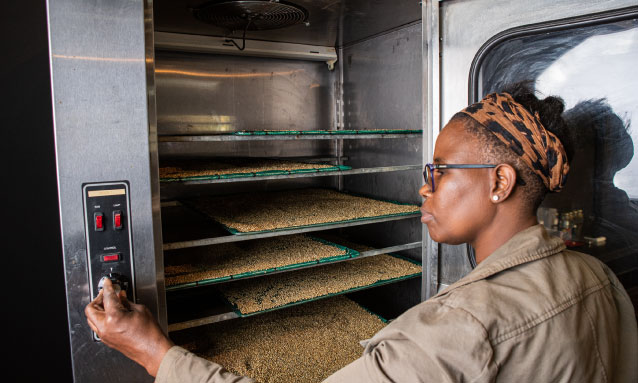
You mentioned earlier that you source your ingredients locally. Can you explain this works?
We buy and transport our millet grain from ‘elephant aware’ farmers around the Okavango Delta Panhandle. Currently, we have over 10 tons of millet in storage, which we malt on-site at the brewery before it’s used in the brew. The malting process is the key to unlocking the potential of millet as a key ingredient in our brew recipes. It’s a highly technical process and has taken years to perfect. But with this experience under our belt, we are now confident in its ability to contribute a great, unique flavour. We have to import some of the ingredients like speciality malts, hops and yeast, as they are not available in Botswana.
What varieties do you make in terms of flavours? Can you please describe them?
Our beer selection was developed to please all beer tastes: a quality larger (Delta Larger), a session IPA (The Kingfisher), our Panhandle Pale Ale, the Matriarch American Amber Ale and our Irish-style Stout (Old Bull) range offers a wide variety of beer types for different tastes.
Are there any plans to ever diversify your offer away from craft beer to other beverages?
Yes, for sure – any business has to look at the opportunities out there and there’s some exciting products that are gaining lots of traction in the marketplace that we’d like to make ourselves, which we have the capacity and technical expertise to do. We are currently developing a low-alcohol beer, a product that has seen huge increases in sales over the last year elsewhere. Also, we have developed our own cider, which we will launch in cans soon. There are a few other ideas in the pipeline that we’d like to pursue in the near future. It would be a thrill to explore potential partnerships with larger like-minded companies to deliver larger, broader scale impact.
Our whole mission is to support local economies, local farmers, local industry and address the escalating Human-Wildlife Conflict situation in our region. It’s not easy and as one supporter recently said, we are merging three value chains: agricultural, tourism and manufacturing – not many have done this, and there are added challenges and some misperceptions.
We feel strongly that by promoting local economies, based on sustainable principles and cross-sectoral pollination, we will contribute to alleviating some of the conflicts we currently face among industry sectors.
This will help bolster sustainable economic growth for Botswana: an important part of Botswana’s vision for sustainable and equitable development.
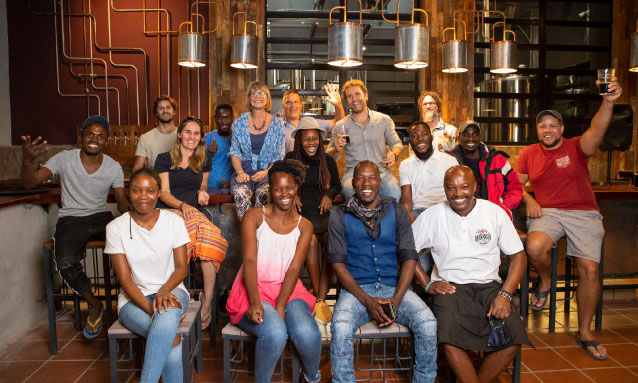
Exciting times! Ahem! Being lightweights ourselves, we’ll definitely be looking forward to the new low-alcohol beer and cider. Where can people buy your craft beer?
The original business plan was developed around the brewpub model, serving quality beer over the counter and offering a new pub-restaurant experience at the brewery, in the tourism hub of Maun town. Since COVID-19, the Okavango Craft brewery team, like many businesses, have had to adapt and change course, moving to coupling the brewpub with a distribution sales strategy. Now that the sale of alcohol is permitted in hotels and lodges as well as for home consumption, we have launched our beer in cans for distribution. Soon, we will get it out to other outlets in Maun and around Botswana through agents, selected liquor stores and an ordering and takeaway service from their premises.
How has the ongoing COVID-19 pandemic affected business?
It’s hit us hard, like most other businesses out there. We’ve not been able to sell alcohol on site for most of the COVID period, and progress has required us to invest a lot more to survive.
What challenges have you encountered so far?
The alcohol ban and restrictions have been a big restraint to sales and not knowing how to plan your exit, what this entails and when to do it has been a global blight to businesses, especially start-ups.
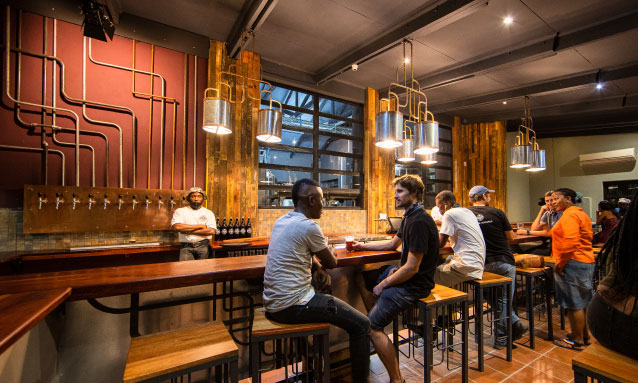
We will be rooting for Okavango Craft Brewery, for sure. What would you say is the hardest part of doing what you do, if anything?
Beer drinking restraint! Seriously, it’s been a pleasure setting this business up for production and operations. Keeping our staff complement of 15 Batswana supported through these tough times has been a constant business dilemma with serious economic consequences, but we were determined to do so. I would, however, like to see our business, especially start-ups in the food and beverage industry and other industries hardest hit by the pandemic like the tourism industry, given some assistance to survive the impacts of COVID, mainly tax breaks and help with critical services. Economies and job creation are built on supporting, incentivising and encouraging start-ups to innovate and diversify. Therefore, additional support could help a lot through this period to achieve these goals.
What do you love most about being in this line of work? What excites you the most about what you do?
Not much beats the opportunity and honour of tasting each new batch of our unique craft beer or sinking that first pint of stout after work on a Friday afternoon. But what drives me and I think all our shareholders, is that we are a Maun-born company with a unique story behind us, which will give us provenance and generate a sense of pride among our local consumers. Our unique story has an important social and conservation impact with key supporting messages, which will appeal to people, in particular the growing number of responsible tourists, who want to support such initiatives when visiting the Okavango Delta. That’s enough to get me out of bed each morning.
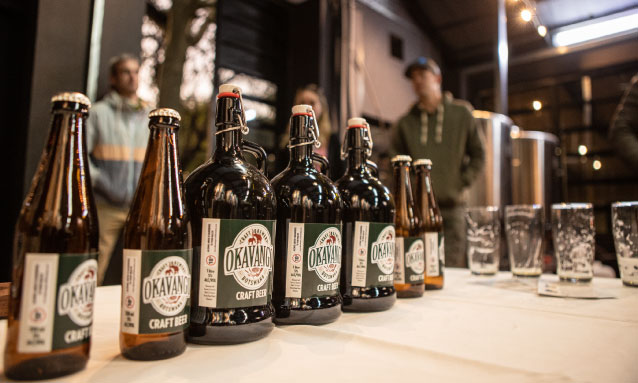
Who is your product aimed at?
The local market and tourism industry in Maun and Botswana’s towns and cities.
How long after ‘dreaming up’ the idea did OCB become a reality? How has the response to OCB been?
It’s taken many years of dreaming, but about four years of hard slog, and the response from the local community has been amazing. We’ve been blown away by the support from Batswana and the sense of pride in our truly authentic product.
What does a typical day at OCB Brewery look like?
It’s a little chaotic at times when there’s a brew on and the renovations and maintenance is ongoing, but the smell of the brew is a joy to work around. The brewery is a separate operation to the brewpub, but they rely on each other. Indeed, clients at the brewpub, while unable to gain access unless guided, can see the brewery from the pub-restaurant, making for an authentic brewpub experience. The taps behind the bar connect straight to the brewery cold room, where the kegs of beer are kept, allowing for consistent quality beer. So, it’s usually quite busy around the taps! The kitchen, where the chef and assistants are usually preparing quality food to go with our beer, is also very busy.
And the brewpub experience is complete with an open-plan pub that spills out onto an extensive beer garden, allowing for considerable numbers and giving the venue an authentic, enjoyable vibe.
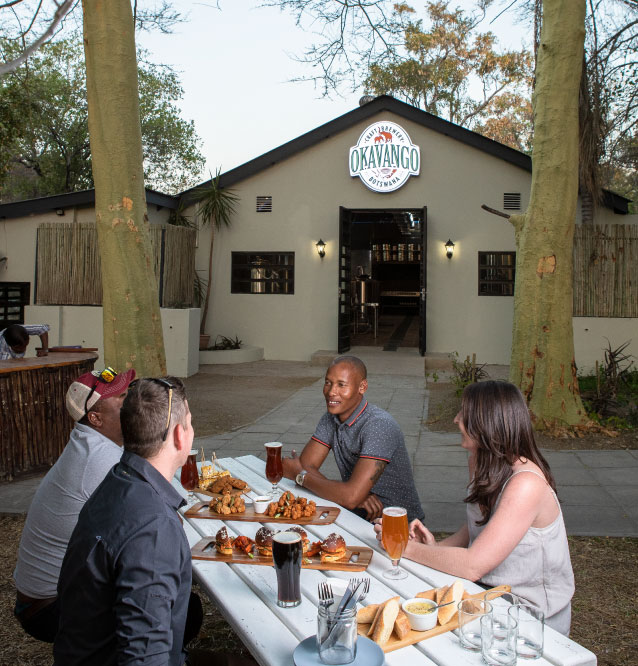
Wow, we never knew you also offered food! Okavango Craft Brewery has to be on our must-visit list when we are next in Maun. What are you currently working on, what’s in the pipeline?
We are busy making some additional beverages and hope to expand in the near future. it would be a thrill to explore potential partnerships with larger like-minded companies to deliver larger, broader scale impact. Our whole mission is to support local economies, local farmers, local industry and address a growing Human-Wildlife Conflict situation in our region.
It’s not easy and as one supporter recently said, we are merging three value chains: agricultural, tourism and manufacturing – not many have done this and there are added challenges and some mis-perceptions. We feel strongly that promoting local economies, based on sustainable principles, and cross-sectoral pollination, we will contribute to alleviating some of the conflicts we currently face among industry sectors, which will help bolster sustainable economic growth for Botswana: an important part of Botswana’s vision for sustainable and equitable development.
Making craft beer must be really involved and labour-intensive. What do you do to unwind?
Sinking a pint of your favourite brew is a no-brainer. But there’s lots of options to escape into the Okavango swamps or nearby bush, on occasion, to enjoy the areas amazing wildlife and get some respite.
When you put it like that, we want your life! What other pies have you got your Bingers in – any other projects in the pipeline? Anything exciting on the horizon? What’s next for OCB?
The brewpub renovations have been completed, and we are opening this month for food. An opportunity to taste the beers is also on offer, in controlled numbers of course.
The Okavango Craft Brewery is also now hosting tourists and the general public to come on a brewery tour. For P200 per person, we take guests on a tour of the brewery, introduce them to the process of brewing and the whole story behind the brewery, after which a sample of the various beer types we make and a beer of your choice is provided in the brewpub next door.
The team hopes this will add to the tourism activities Maun has to offer, raising more awareness and support for the local economy, its people and the wildlife of the Okavango. We look forward to growing this business and ensuring throughout that we spread the message of responsible drinking and positive behaviour, in line with the values of our brand. We remain committed to making a meaningful contribution to the economy as a proudly Botswana business ready to support the economy and the community it is so proud to call home.
We don’t know about you, but we know exactly what we’ll be doing next time we are in Maun! Have you had the Okavango Craft Brewery experience? Please share your thoughts with us 🙂
Interview by YourBotswana writer

